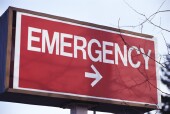Adverse reactions, misuse are the common culprits
MONDAY, Feb. 2, 2015 (HealthDay News) — At one Canadian children’s hospital, medication-related problems accounted for one in 12 emergency department visits over a year. And about two-thirds of those incidents were preventable, the researchers concluded. The findings have been published online Feb. 2 in Pediatrics.
The study findings are based on 2,028 children and teenagers — average age 6 — who arrived at a pediatric emergency department in Halifax, Nova Scotia, over the course of a year. Overall, 8 percent were considered to have “medication-related” symptoms.
Adverse drug reactions and non-adherence were the culprits in 26 and 17 percent of cases, respectively. Another 19 percent of children were not taking a high enough medication dose, and in 12 percent of cases, an “improper” drug was prescribed. The researchers only had information on general drug classes. The most commonly implicated medications were those that treat infections or asthma, or that act on the central nervous system. The team also found that certain patients were at increased risk of a medication-related problem, including those with multiple health conditions or more than one prescribing doctor.
Lead researcher Peter Zed, Pharm.D., a pharmacist and associate professor at the University of British Columbia in Vancouver, Canada, told HealthDay that doctors and other providers need to do their part to prevent these kinds of emergency department trips. He suggested that they need to be vigilant that they are prescribing the best medication for a child’s symptoms, at the optimal dose. They also need to follow up with parents to make sure that not only is a drug not causing problems but is working adequately, Zed added.
Copyright © 2015 HealthDay. All rights reserved.








